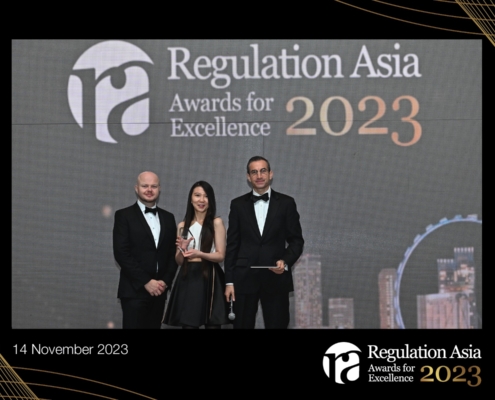HKMA Issues New AML/CFT Guidance for Private Banks
The Hong Kong Monetary Authority (HKMA) recently issued new guidance on Anti-Money Laundering/Counter-Financing of Terrorism (AML/CFT) for private banks in Hong Kong*
One of the key requirements outlined in the HKMA’s new guidance is the need for private banks to provide regular and ongoing training to their staff on AML/CFT issues.
In this regard, the HKMA Guidance is consistent with the stance taken by regulators worldwide.
In this article, we look at the implications of these requirements and offer some suggestions on how to meet them
The HKMA guidance is designed to help private banks better understand their AML/CFT obligations and to provide them with practical guidance on how to manage their risks effectively.
One of the key requirements outlined in the HKMA’s new guidance is the need for private banks to provide regular and ongoing training to their staff on AML/CFT issues. This is a crucial element of any effective AML/CFT program, as it ensures that staff are aware of the risks they face and the actions they need to take to mitigate them.
The importance of staff training in AML/CFT cannot be overstated.
In recent years, we have seen a significant increase in the sophistication and complexity of money laundering and terrorist financing activities. Criminals are constantly finding new ways to circumvent the controls put in place to detect and prevent their activities. As such, it is essential that staff are kept up to date with the latest developments in AML/CFT, and that they are able to identify suspicious activities and report them appropriately.
The HKMA’s guidance emphasizes the need for banks to ensure that their staff are properly trained in a number of key areas, including:
- Understanding the risks of money laundering and terrorist financing
- Knowing how to identify and report suspicious transactions
- Understanding the requirements of the AML/CFT laws and regulations
- Knowing how to implement effective customer due diligence (CDD) measures
- Understanding the role of technology in AML/CFT
In addition to providing training on these areas, the HKMA also recommends that private banks conduct regular assessments of their staff’s AML/CFT knowledge and understanding.
This can be done through a variety of methods, such as attestations and online quizzes and tests.
Training is an ongoing process
It is important to note that AML/CFT training should not be a one-time event. Rather, it should be an ongoing process that is regularly reviewed and updated to reflect changes in the risk environment and new regulatory requirements. Staff training should also be tailored to the specific roles and responsibilities of each employee, as different roles may face different risks and require different levels of knowledge and understanding.
The HKMA’s new guidance on AML/CFT for private banks in Hong Kong highlights the importance of staff training in the fight against money laundering and terrorist financing. Private banks must ensure that their staff are properly trained in a number of key areas, and that this training is an ongoing process that is regularly reviewed and updated. By investing in staff training, private banks can reduce their exposure to AML/CFT risks and help to protect the integrity of the financial system.
*https://www.hkma.gov.hk/media/eng/regulatory-resources/consultations/AML_Guideline_(AI)_20230118.pdf
So how can businesses effectively meet these regulator requirements?
Putting in place a system of ongoing, effective training for AML/CFT (along with all the other regulator-required training) poses enormous challenges for regulated entities.
Three key aspects need to be borne in mind
- Keeping the training relevant
- Choosing the appropriate delivery channels
- Ensuring the optimum user experience
Relevance
Keeping training in areas like AML, fraud, privacy and so on, relevant to job roles presents considerable challenges to L&D teams. There will always be push-back from specialist teams who often have the view that every member of staff should be trained in every aspect of the subject area.
But to be effective, training must be targeted to the actual operational needs of the staff being trained.
If staff are subjected to training that is irrelevant to their roles, this results in:
- unnecessary cost to the business in terms of time away from the job
- disengagement of staff from compliance training in general – with consequent reduced effectiveness of the training
- reduced effectiveness of the training itself, as staff are given more to learn than they can be expected to take on board
To be relevant to a staff member’s role, training must be:
- Focused on those aspects of the subject that the staff member regularly comes into contact with
- Set at the appropriate depth and level of complexity
- Of an appropriate length
- Up to date
One of the great challenges faced by L&D teams is keeping abreast of legislative and practical developments in order to keep their compliance training up to date. It makes sense to ensure that you utilize the services of a professional compliance training company that can demonstrate its commitment to keeping their training products current.
The appropriate channel
Online compliance training is an excellent part of the L&D armory: it allows learners to proceed at their own pace, it provides challenges to learners by confronting them with points they may not be familiar with, and it gives real-time rewards for successful completion.
But online training needs to be supported by face-to-face training.
Face-to-face can deliver particular benefits:
- regular reminders and refreshers
- relating training to current issues faced by the team
- by championing the training it conveys the sense that the business takes the training seriously
In the case of front-line staff, face-to-face is often most effective when it is delivered by the line manager. Training for managers and specialist staff can often be more effective when delivered by an external SME.
User Experience
There has been a considerable amount of research done on designing online compliance training. To maximize the user experience, online training should be designed by professional creators, applying their skills to content created by subject matter experts.
Learners will not respect training that is not
- Professionally designed
- Up to date
- Accurate
- Fresh – not the same training year after year
In addition, being subjected to training in areas where they are already competent is a great generator of learner disengagement
GRC Solutions can help
GRC Solutions offers off-the-shelf and bespoke compliance training modules on anti-money laundering and counter-financing of terrorism.
Our training is kept up to date – our legal and compliance teams constantly monitor for relevant developments and incorporate them into our training products.
We also offer consulting services. Our consultants can help by assessing your AML program and your AML Risk.
We partner with multi-award winning global RegTech firm, Arctic Intelligence, to promote their range of risk assessment software.
Download our brochure here
AML/CFT Training Products
Singapore
Anti-Money Laundering – Singapore
Malaysia
Anti-Money Laundering – Malaysia
Australia
Anti-Money Laundering– covering the responsibilities of financial services and other businesses in general
AML/CTF Training for Finance Sector – covering the particular responsibilities of ADIs
New Zealand
Anti-Money Laundering – New Zealand












